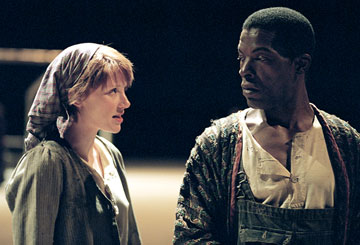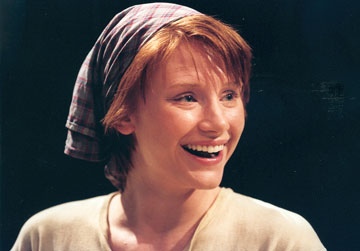

Danish director Lars von Trier (Dear Wendy, The Five Obstructions) continues his trilogy about America with Manderlay, the follow-up to Dogville. Nicole Kidman had to drop out of the title role due to scheduling conflicts, and replacing her is Bryce Dallas Howard (The Village, Book of Love), daughter of some guy named Ron Howard. Von Trier employs the same sparse setting, has a similar mammoth running time, and slowly goes off the deep end. Manderlay is a bit frustrating because while von Trier has some interesting things to say, his reputed hatred of America is a bit too simplistic and casts a whiny cloud over the entire film.
The fact that he does not like this country is not a problem. Many of his recent films are set in the US, although he famously refuses to fly here. It's just that von Trier seems to hate America without a good reason. His views come out in the way his characters act. They are often stupid and boorish. Dear Wendy was so far removed from reality that it was a parody. The same problems are present in Manderlay. After her adventures in Colorado, Grace (Howard) makes her way to the Deep South where slavery has been institutionalized despite the fact that the Civil War ended over seventy years ago. She stumbles upon the plantation Manderlay, where she feels in her naivete that she can show these former slaves how to be self-sufficient.
The frustrating aspect of Manderlay is that von Trier mixes in some extremely interesting provocative material with some extremely stupid provocative material. He dares to go where no filmmakers dare - into the world of slavery, a subject still taboo in today's movies. Von Trier explores the dynamics of plantation life, exploring how Southerners feel about blacks, and how they feel about whites. Everything is viewed through the eyes of Grace, an outsider who can look at things through a new set of eyes. Grace feels that she can educate and "civilize" these ex-slaves, and build a progressive Southern utopia. Totalitarianism gives way to democracy. Von Trier does acknowledge some of the foibles of her aspirations, especially since some of the former slaves are smarter than she thinks, although late in the film he backtracks and his negative feelings reemerge. Duplicity and unrealistic ambitions become themes, with no party safe.
Sadly, the stage is the most interesting aspect of Manderlay. There are few props, and von Trier marks most buildings with simple lines on the ground. People shut imaginary doors although viewers still hear the foley. In a sense, it was good that Kidman exited the role of Grace. Grace's naivete is more befitting of a younger actor, and Howard is fifteen years younger than Kidman. The one good thing that does come out of the film is the performances. This was Howard's first film, and she gives a strong, assured performance. Danny Glover (The Cookout, Saw) is also good as Wilhelm, the eldest and one nominally in charge. Odder, actors like Lauren Bacall, Chloe Sevigny, and a few other actors appear in both films, but as different charactes. Still, with its structure (Manderlay has eight chapters), settings, and short interludes of classical music, von Trier manages a pretentious air about the film. There's one more film to go, and honestly, it's good that the end is in sight.